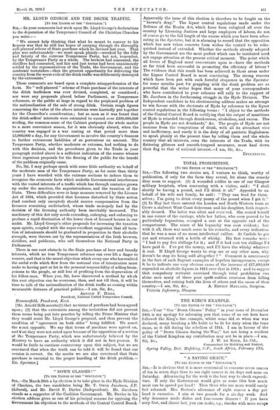MR. LLOYD GEORGE AND THE DRINK TRAFFIC.
[To THE EDITOR OP THE " SPECTATOR."'
Ern,—In your comments last week upon Mr. Lloyd George's declarations to the deputation of the Temperance Council of the Christian Churches you write :-
" We cannot help thinking that what he meant to convey to his Bearers was that he still has hopes of carrying through the thoroughly well-planned scheme of State purchase which he devised last year. That plan was unfortunately—we must speak plainly—wrecked by the folly and fatuity of the extreme Temperance Party, but not, remember, by.the Temperance Party as a whole. The brewers had consented, the distillers had consented, and fair and just terms had been unanimously settled by the representatives of the Trade, the Government, and the moderate teetotakra—then the greatest op dimity for delivering the country from the worst evils of the drink tra c was deliberately destroyed by the extremists."
These comments are based upon a complete misapprehension of the fact& No " well-planned " scheme of State purchase of the interests of the drink traffiekers was ever devised, completed, or considered ; nor were any proposals placed before Parliament, or Temperance reformers, or the public at large in regard to the perplexed problem of the nationalization of the sale of strong drink. Certain rough figures concerning the value of the above interests were hurriedly put together for the Chancellor's consideration ; but so soon as it was found that the drink-sellers' interests were estimated to exceed over £300,000,000 sterling, the common-sense of the Cabinet postponed the whole matter to, a more convenient season, for it was obviously absurd, when the country was engaged in a war costing at that period more than £3,000,000 a day, for any Government to involve the country's finances in further extraneous liabilities of so portentous an amount. The Temperance Party, whether moderate or extreme, had nothing to do with this decision, and the precedence given to the Trade in your paragraph recited above is a sufficient indication of the source whence these ingenious proposals for the fleecing of the public for the benefit of the publican originally came.
No, Sir, I may perhaps speak with some little authority on behalf of the moderate men of the Temperance Party, as for more than thirty years I have wrestled with the extreme sections to induce them to recognize the economic facts which underlie Governmental interference with the vested interests of a traffic which has through centuries grown np under the sanction, the superintendence, and the taxation of the State, These difficulties were in large measure removed by the Licence Act of 1904, which provided that licensees disturbed by State action (bad conduct only excepted) should receive compensation from the licensees remaining undisturbed, whose trade monopoly had by the decision of the licensing authority been inevitably increased. The machinery of this Act only needs extending, enlarging, and enforcing to produce a rapid diminution of the lower class of licensed houses in our midst. Mr. Lloyd George's other proposals for increasing the taxation upon spirits, coupled with the super-excellent suggestion that all taxa- tion of intoxicants should be graduated in proportion to their alcoholic strength, were thrown out by the representatives of the Irish brewers, distillers, and publicans, who call themselves the National Party in Parliament.
There is one root obstacle to the State purchase of beer and brandy interests, which no true Temperance reformer can ever lift a finger to remove, and that is the moral objection which every one who has realized the awful evils which flow from the national vice of intoxication must make to having part or lot in the personal.responsibility of selling brain- poisons to the people, or still less of profiting from the depravation of his fellow-man. When you, Sir, have 'discovered a method by which this root objection can-be overcome, then, and not till then, it will be time to talk of the nationalization of the drink traffic as coming within measurable distance of practical politics.—I am, Sir, &o., Anxorm F. Huns, President, National United Temperance Council.
Hammerfield, Penshurst, Kent.
[Mr. Arnold Hills asserts (1) that no terms of purchase had boon agreed upon ; (2) that the extremists among the teetotalers did not prevent these terms being put into practice by telling the Prime Minister that they would resist Mr. Lloyd George's proposal, and thus prevent the condition of " agreement on both sides " being fulfilled. We assert the exact opposite. We say that terms of purchase were agreed on, and not they were not acted upon because of the opposition of a section of the Temperance Party, which was unfortunately believed by the Ministry to have an authority which it did not in fact possess. It would be futile to continue controversy upon this subject, but we are convinced that when the truth can be told it will be found that our version is correct. On the merits we are also convinced that State purchase is essential to the proper handling of the drink problem.— ED. Spectator.]


























 Previous page
Previous page